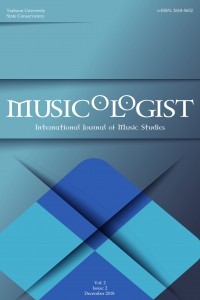
Musicologist
Yazarlar: ["Gonca GİRGİN"]
Konular:-
DOI:10.33906/musicologist.1097843
Anahtar Kelimeler:Urban dance,Alaturca,Urban culture,Urban dance history,Istanbul
Özet: In the sources of dance history in Türkiye, there is no classification that evaluates urban dances, which are mostly mentioned in entertainment contexts, in terms of function, contents and social acceptance and made with this focus. Dance in the history of the Republic has been mostly examined within the framework of identity, representation and ideological patterns, and historical analyses have been considered with this relationship focus. In addition, these subjects are embodied in the national repertory, which is generally accepted as official and thus reflects a dominant traditionalism. In this study, my aim is both to present a historical literature summary of popular urban dances and to embody similar subjects through alternative repertories in the context of the “other” determined by the relationship with the official one. Urban folk music was not included in the national repertoire, at least until the 1950s, and urban dances were not included in the category of Turkish Folk Dances in the compilations of the early Republican period. In this way, popular urban dances were left out of the national repertoire and were positioned as “the other” of dance cultures in Türkiye. This study, on the other hand, focuses on the general history of the repertoire, the definition of which is proposed as "dances that are excluded from the official discourse but exist in the cultural practices of the city, whose social acceptance has been realized and have become widespread by any agents (migration, mass media, etc.)". The draft of the urban dance repertoire, which has this quality, was determined through metadata from newspapers, magazines and new media content, and the data obtained is re-interpreted together with the previous literature sources. The case for research was determined as Istanbul, both because it changed a great deal during the 20th century, and because it converted little. Istanbul allows us to trace the sustainable clues of cultural practices, because dance practices are in a central position in the product and market relationship in this historical process.